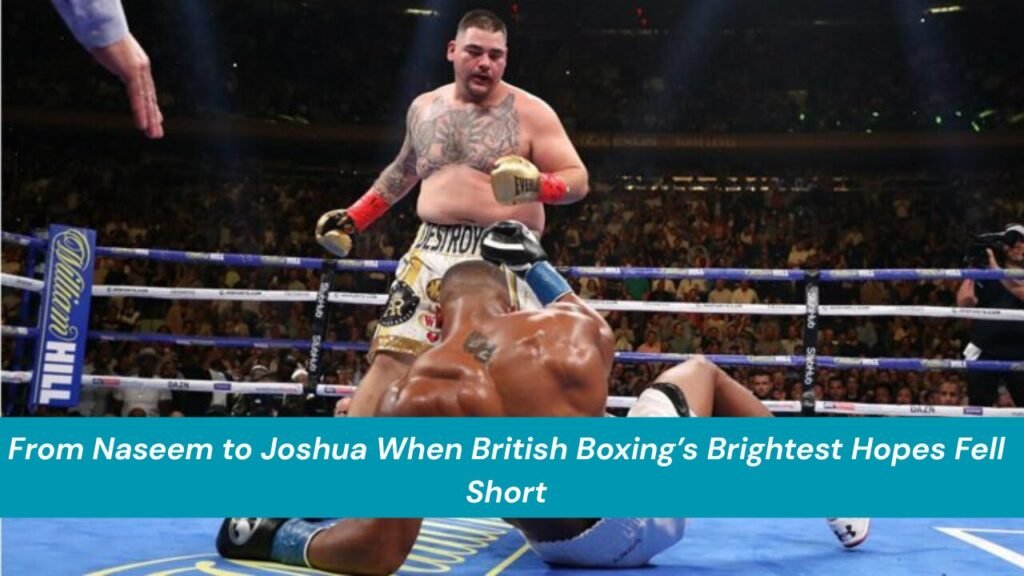Few sporting nations wear their boxing heart on their sleeve quite like Britain. From the electric nights at Manchester Arena to the roaring atmosphere of Wembley Stadium, British fighters have always been more than athletes; they are torchbearers of national pride. Every generation produces a new face of hope, someone billed as the heir to Lennox Lewis or Ricky Hatton, destined to bring glory back to Britain’s fighting tradition. Yet with such acclaim comes extraordinary pressure, and when things unravel, they unravel in a way that leaves scars on both the boxer and the fans who believed in them.
The history of the sport is filled with such nights of heartbreak. These are the moments when British boxing’s brightest hopes seemed destined for greatness but instead met with shocking, humbling defeats. From the fall of Prince Naseem Hamed to Anthony Joshua’s recent setbacks, the story of British boxing is as much about the agony of defeat as the thrill of victory.
Key Takeaways
- British boxing heroes often face immense pressure due to early hype, media attention, and public expectations.
- High-profile defeats, like those of Naseem Hamed, Amir Khan, and Anthony Joshua, illustrate the fragile nature of stardom in the sport.
- Stylistic vulnerabilities and premature exposure to elite competition increase the likelihood of unexpected losses.
- Resilience and mental strength allow some fighters, such as James DeGale and Dave Allen, to recover and achieve redemption.
The Legacy of British Boxing’s Brightest Hopes
British boxing’s relationship with its heroes has always been intimate and emotional. Fighters are not merely supported; they are exalted. A boxer who rises through the amateur ranks and captures the imagination of the public is often propelled into the limelight before their career truly matures. The hype machine of promoters, broadcasters, and media outlets turns contenders into national icons overnight. This cycle creates enormous expectations.
Prince Naseem Hamed, for example, was more than a featherweight champion; he was a symbol of youthful exuberance, swagger, and cultural flair in the 1990s. Amir Khan carried the weight of being Britain’s Olympic prodigy after Athens 2004, seen as the man to bridge amateur brilliance with professional dominance. Anthony Joshua, meanwhile, was positioned as the poster boy of a new golden era after his Olympic triumph in London 2012. These men weren’t just fighters; they were public figures tasked with embodying national pride.
The darker side of this narrative is that when they lose, it feels as though a collective dream has been shattered. Their defeats are not simply sporting failures—they become public reckonings, replayed in headlines, documentaries, and heated debates long after the final bell.
High-Profile Nightmares
Prince Naseem Hamed When flamboyance met defeat
Prince Naseem Hamed built his reputation on a unique blend of charisma and knockout power. His extravagant ring walks, backflips into the ring, and bravado made him one of the most compelling figures British boxing had ever seen. For years, he seemed untouchable, dispatching opponents with unorthodox punches and dazzling reflexes. But in April 2001, he stepped into the ring against Mexican legend Marco Antonio Barrera. What followed was not just a loss but an unraveling of an aura. Barrera neutralized Hamed’s style with surgical precision, outboxing him across twelve rounds and handing him his first professional defeat. The psychological blow was so severe that Hamed fought only once more before retiring. It was a stark reminder that brilliance and charisma can only carry a fighter so far when they meet an opponent of equal skill and greater discipline.
James DeGale’s reality check
James DeGale’s career trajectory tells a slightly different story. DeGale entered the professional ranks with enormous expectation as Britain’s first Olympic gold medalist to transition into the pros. Yet early on, he suffered a painful setback against domestic rival George Groves. The defeat was labeled by DAZN as “a reality check,” one that threatened to derail his ambitions. But unlike Naseem, DeGale used the disappointment as fuel. He rebuilt his career, refined his skills, and eventually captured a world championship, proving that even when British fighters fall short on big nights, redemption is possible with resilience and self-belief. His journey remains a template for how defeat can shape champions rather than define failures.
Amir Khan brilliance and fragility
Amir Khan represents the duality of British boxing hope and heartbreak more vividly than almost anyone else. His blinding hand speed, relentless combinations, and willingness to face world-class opponents made him thrilling to watch. But his defensive flaws and fragile chin repeatedly undid him on the biggest stages. His shock loss to Breidis Prescott in 2008 stunned fans and nearly ended his rise. Later defeats to Danny Garcia and Canelo Álvarez reinforced the perception of Khan as a fighter with dazzling skills but fatal vulnerabilities. His career encapsulates the fine line British boxers often tread between brilliance and collapse.
Modern Fortunes Reversed Joshua, Fury & Beyond
Anthony Joshua was not just a heavyweight; he was marketed as a global phenomenon. After winning Olympic gold in London, he transitioned into the professional game with a blend of power, humility, and marketability that captured the imagination of both hardcore fans and casual viewers. His victory over Wladimir Klitschko in 2017, a dramatic battle at Wembley, seemed to cement his status as the face of heavyweight boxing. Yet, the sport is cruel. In 2019, Andy Ruiz Jr. stunned the world by knocking Joshua out in New York. Though he avenged the defeat later that year, the aura of invincibility was gone. Subsequent losses to Oleksandr Usyk exposed flaws in his adaptability and movement. And in 2024, his stoppage loss to fellow Briton Daniel Dubois was another painful reminder that even the brightest star can be undone by the ruthless unpredictability of the heavyweight division.
Tyson Fury’s career serves as both contrast and complement. Known for his unorthodox style, towering frame, and outsized personality, Fury dethroned long-reigning champion Wladimir Klitschko in 2015 and later outclassed Deontay Wilder in their trilogy. For years, he was hailed as the sport’s ultimate survivor, a man who conquered personal demons and remained unbeaten in the ring. Yet even Fury’s story was not immune to the cycle.
In 2024, Oleksandr Usyk defeated him twice in the same calendar year, first by split decision in May and then by unanimous verdict in December. Suddenly, Fury’s aura of invincibility evaporated. Retirement whispers followed, leaving fans to wonder if the Gypsy King’s era had come to an end.
Upsets in 2025 The Rising Stars and the Shattered Odds
If 2024 was a year of reckoning for established stars, 2025 has already provided fresh examples of promise undone. One of the most striking came when Ekow Essuman, considered a seasoned contender rather than a headline act, shocked Josh Taylor. Taylor, a former undisputed champion, was expected to breeze past Essuman, but instead found himself outworked and dethroned as Essuman claimed the WBO Global welterweight title. For Taylor, the loss was devastating, underscoring how reputations mean little once the bell rings. For Essuman, it was the night of his career, proving that perseverance can pay off even against the brightest of stars.
Another moment that captured the imagination of the boxing world came when Chris Eubank Jr. finally faced Conor Benn in a bout dripping with family legacy and anticipation. The fight lived up to the billing, with brutal exchanges, dramatic momentum shifts, and moments where both men seemed on the verge of collapse. Although the result was secondary to the spectacle, the narrative was clear: two fighters carrying enormous expectations had risked everything, and the outcome reminded fans of the razor-thin margins that separate triumph from despair.
Meanwhile, Dave Allen, once regarded as little more than a plucky journeyman, produced a knockout victory over Johnny Fisher in their May 2025 rematch. For Allen, the win was redemption after years of struggle, and for Fisher, it was a devastating setback that illustrated how quickly careers can unravel. The Manchester crowd witnessed not just a knockout but the cruel theatre of boxing, where one man’s glory is always carved from another’s defeat.
What Makes British Boxing’s Brightest Hopes Prone to Collapse?
The pattern of high expectations followed by devastating losses is not coincidental. Several intertwined forces create a uniquely volatile environment for British boxers. One of the most significant is the culture of hype. Promoters and media outlets build fighters into superstars early in their careers, sometimes before they have faced genuine world-level tests. This hype fuels ticket sales and TV ratings but also places immense psychological pressure on athletes.
Cultural weight also plays its part. British boxing fans are famously passionate, and when they embrace a fighter, they do so completely. That adoration can be intoxicating but also suffocating. A loss does not merely disappoint; it feels like betrayal. Stylistically, many British fighters who capture the imagination—such as Amir Khan or Naseem Hamed—do so with flair, speed, and offensive brilliance. Those styles are crowd-pleasing but often carry vulnerabilities that more disciplined, technically sound opponents can exploit.
Finally, the matchmaking philosophy in Britain often pushes fighters into high-risk contests earlier than in other boxing markets. The appetite for marquee fights means that young stars like Adam Azim, dubbed the “new Naseem,” face dangerous opponents before their flaws are ironed out. While this can accelerate greatness, it also creates the potential for devastating setbacks.
Lessons Learned From Defeat to Redemption
Despite these collapses, British boxing is also defined by resilience. James DeGale’s story shows how a painful loss can become a catalyst for growth. Anthony Joshua, even after multiple defeats, remains driven by a desire to secure legacy-defining fights, insisting he wants to leave the sport “with a bang.” Dave Allen’s knockout of Johnny Fisher in 2025 is a more modest but equally inspiring reminder that perseverance can rewrite narratives.
These stories illustrate that defeat in boxing is never final. For some, like Prince Naseem, it marked the end. For others, it became the foundation for redemption. The recurring theme is not simply collapse but the possibility of resurgence, a quality that makes boxing uniquely compelling.
FAQs
Why do so many top British boxers lose big fights unexpectedly?
The answer lies in a combination of factors. Enormous hype often propels fighters into high-profile bouts before they are truly ready. The cultural and media pressure can distort preparation, while stylistic vulnerabilities like Amir Khan’s defensive lapses or Joshua’s struggles against smaller, agile opponents are ruthlessly exposed at world level.
Who are the most shocking upsets in British boxing history?
Prince Naseem Hamed’s defeat to Marco Antonio Barrera remains one of the most iconic. Joshua’s loss to Andy Ruiz Jr. in 2019 was another seismic shock, as was Amir Khan’s early knockout against Breidis Prescott. More recently, Josh Taylor’s upset loss to Ekow Essuman in 2025 has joined the ranks of Britain’s most surprising defeats.
How do fighters recover mentally after high-profile defeats?
Recovery is often more psychological than physical. Fighters typically reassess their training camps, change coaches, or modify their fighting style. Mental resilience, however, is key. Champions like DeGale and Joshua show that rebuilding confidence and motivation after a crushing defeat is essential to bouncing back.
Will the Joshua-Fury fight ever happen?
Fans have long clamored for a showdown between Britain’s two most famous heavyweights. While negotiations have faltered in the past, both men have expressed a desire to fight. Given Fury’s recent defeats and Joshua’s need for a career-defining finale, the bout remains a possibility, though time is running out for it to materialize.
Conclusion
The story of British boxing’s brightest hopes is one of brilliance, collapse, and redemption. From Naseem Hamed’s flamboyant fall to Anthony Joshua’s turbulent reign, from Amir Khan’s fragile brilliance to the rising and falling fortunes of fighters like Taylor and Benn, these narratives illustrate a fundamental truth of the sport: hype can fill arenas, but it cannot guarantee victory.
For every crushing setback, however, there is the possibility of resurgence. British boxing continues to produce fighters who embody resilience, heart, and the willingness to risk everything under the spotlight. That is why, even after nights of heartbreak, the arenas remain full and the hopes remain high.




